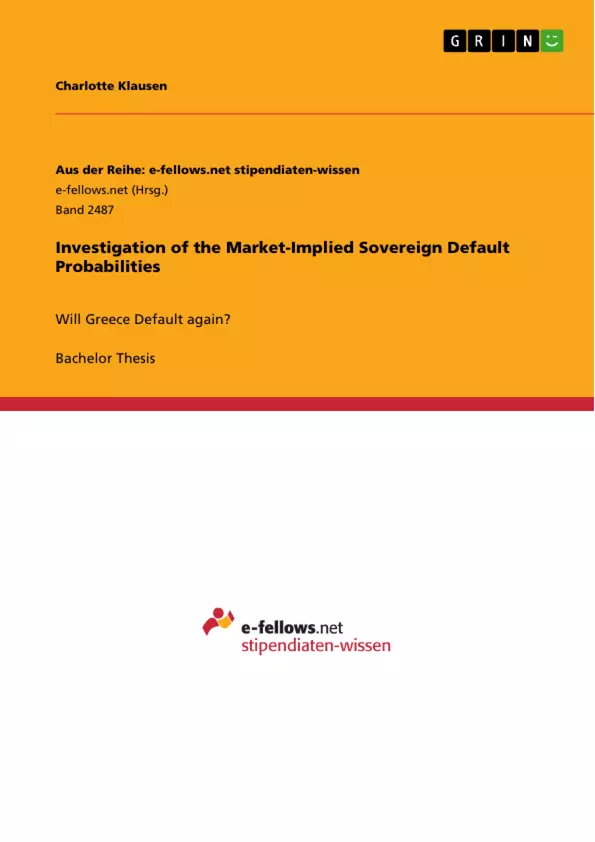This thesis investigates the default probabilities of market-implied sovereign default probabilities by using credit default swap (CDS) spreads and conducts an analysis of the spreads’ determinants. Building on the no-arbitrage pricing model of CDS, the probabilities for Greece defaulting within the next five years from today is approximately 75%, assuming a recovery rate of 25%. Against economical intuition, the results provide a positive correlation between the recovery rate and CDS spreads.
A comparison of Greece’s default in 2012 with its default probabilities indicates that spreads closer to 2012 are much higher, hence imply higher default probabilities and therefore capture the default accurately. Though, spreads taken exactly T years before the default provide vague, i.e. very low default probabilities.
The regression analysis provides different results for the determinants of spreads of either country, though in neither model all variables are statistically significant individually, e.g. Greece’s spreads can solely be explained by the country specific factor, the unemployment rate. The unexpected negative effects of FX on the spreads could be an indicator of a cracked Eurozone.
Further, the analysis of today’s actual vs. the regression’s predicted spread indicates an overestimation of the predicted spreads of Greece, Italy, Germany and France, where Greece’s absolute difference between the actual and predicted spread by far is the biggest (approx. 7000 BPS). Hence, Greece also seems to be very likely to default from statistical view. Assuming that the statistical model is correct and always overestimates the spreads by a factor of 4.4, then results suggest a potential statistical arbitrage possibility where the arbitrageur would go long in the French spreads and short in the German spreads.
Inhaltsverzeichnis (Table of Contents)
- Introduction
- Problem formulation
- Delimitations
- Methodology
- Theory: Credit Default Swaps
- The contract and its terms
- Corporate vs. sovereign CDS.
- Inferring default probabilities from CDS spreads
- Default probabilities and the hazard rate .\n
- The Arbitrage-free model
- Application of market-implied default probabilities
- Default probabilities in five years for European sovereigns.
- Historical defaults and market-implied default probabilities
- Analysis of CDS spreads
- Greece's, Germany's, France's and Italy's spread evolution
- Determinants of sovereign CDS spreads
- Global risk factors
- Stock market volatility index: VIX
- The risk-free rate
- Foreign Exchange rate, EUR/USD
- Country specific factors.
- Local stock market
- Domestic inflation rate
- Unemployment Rate
- Expected effects of explanatory variables on the spreads.
- Regression results
- Greece's CDS spread determinants
- Germany's CDS spread determinants
- Italy's CDS spread determinants.
- France's CDS spread determinants
- Predicted vs. actual spreads
Zielsetzung und Themenschwerpunkte (Objectives and Key Themes)
This thesis examines the default probabilities of sovereign countries, specifically those implied by credit default swap (CDS) spreads. The primary objective is to analyze the determinants of these spreads, focusing on both global and country-specific factors. Through an empirical investigation, the thesis aims to assess the accuracy of the model in predicting actual default events and identify any potential statistical arbitrage opportunities.
- Credit default swap (CDS) spreads and their relationship to sovereign default probabilities.
- Determinants of CDS spreads, including global risk factors and country-specific indicators.
- Empirical analysis of the accuracy of CDS spreads in predicting sovereign default events.
- Potential statistical arbitrage opportunities based on the relationship between predicted and actual CDS spreads.
- Evaluation of the model's effectiveness in capturing the creditworthiness of European sovereigns.
Zusammenfassung der Kapitel (Chapter Summaries)
The thesis begins by introducing the concept of credit default swaps (CDS) and their use in inferring default probabilities. This is followed by an analysis of the arbitrage-free pricing model for CDS, which provides a framework for calculating market-implied default probabilities. The work then proceeds to apply this model to a set of European sovereigns, specifically focusing on the case of Greece and its 2012 default. The thesis examines the historical spread data for Greece and analyzes its correlation with the actual default event. Furthermore, the thesis investigates the determinants of CDS spreads for four European countries, including Greece, Germany, Italy, and France, through a linear multiple regression analysis. This analysis aims to identify the key factors driving CDS spread movements and evaluate the model's predictive power. Lastly, the thesis concludes with a comparison of predicted and actual CDS spreads, exploring potential statistical arbitrage opportunities arising from any discrepancies.
Schlüsselwörter (Keywords)
This thesis focuses on credit default swaps, sovereign default probabilities, and their determinants. Key concepts include the arbitrage-free model, CDS spreads, global risk factors, country-specific factors, and statistical arbitrage opportunities. The research examines empirical data to analyze the relationship between CDS spreads and actual default events, with a particular focus on the case of Greece and its 2012 default.
Frequently Asked Questions
How are sovereign default probabilities inferred from CDS spreads?
The study uses an arbitrage-free pricing model where Credit Default Swap (CDS) spreads reflect the market's assessment of a country's risk, allowing the calculation of implied default probabilities.
What did the analysis reveal about Greece's 2012 default?
The analysis showed that CDS spreads captured the default accurately as the event approached, with implied probabilities reaching approximately 75% for a five-year horizon.
Which factors determine sovereign CDS spreads?
Determinants include global factors like stock market volatility (VIX) and exchange rates, as well as country-specific factors like unemployment rates and domestic inflation.
Is there a possibility for statistical arbitrage in the CDS market?
The thesis suggests potential arbitrage if statistical models consistently overestimate spreads, for instance by going long in French spreads and short in German spreads based on model discrepancies.
How does the recovery rate affect CDS spreads?
Contrary to standard economic intuition, the results indicated a positive correlation between the recovery rate and CDS spreads in certain scenarios analyzed in the regression.
- Quote paper
- Charlotte Klausen (Author), 2015, Investigation of the Market-Implied Sovereign Default Probabilities, Munich, GRIN Verlag, https://www.grin.com/document/369427



